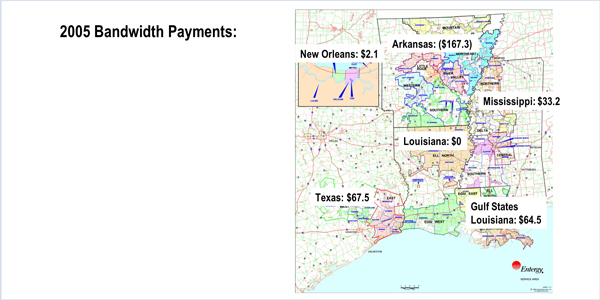By Tom Kleckner
The Arkansas Public Service Commission last week asked the D.C. Circuit Court of Appeals to overturn a FERC decision that rejected the state regulator’s request to exclude Entergy Arkansas from making backdated “bandwidth” payments to its affiliate companies.
The PSC made oral arguments before a three-judge panel on Dec. 15 in a bid to protect the utility’s Arkansas customers from bearing the costs of the payments (16-1193). A decision from the court is likely months away.
Under the Entergy System Agreement, which expired in 2016, low-cost Entergy operating companies made annual payments to the highest-cost company in the system using a “bandwidth” remedy that ensured no operating company had production costs more than 11% above or below the Entergy system average.
The PSC is appealing FERC’s 2015 rejection of a request to shield Entergy Arkansas Inc. (EAI) from making $11 million in retroactive 2005 bandwidth payments and related interest assessed after EAI’s withdrawal from the system agreement in 2013. The state regulator contends the system agreement made no provision for assessing payments after withdrawal, which meant the utility had no continuing obligation to its sister companies (EL01-88-013).
FERC rejected the Arkansas commission’s argument that EAI’s 2005 bandwidth payments — $167.3 million for a seven-month period in 2005, plus $56.5 million in compounded interest — amounted to “exit fees,” saying the payments were “obligations specifically required by the system agreement and are for a period when Entergy Arkansas was subject to the system agreement.” (See FERC Sets Hearings for Entergy’s Cost Allocations.)
FERC also ruled that nothing in a previous order rejecting an Entergy compliance filing related to the agreement indicated that EAI would be excluded from further compliance filings.
Dennis Lane, lead counsel for the PSC, told the court the commission was not challenging an earlier figure of $156 million in 2005 payments, which he said EAI had already paid.
“We’re not asking [FERC] or the court to say we didn’t owe any of the bandwidth payment,” Lane said. “We’re not asking for [the $156 million] to come back. We’re just asking for the $11 million, plus any interest related to that, because that amount was determined after the system agreement was terminated.”
PSC Executive Director John Bethel told RTO Insider that if his agency were to prevail, “the preferential effect would bar payment of the payments and interest due after 2013.”
Lane told the court EAI is heavily reliant on coal, while its sister companies have a lot more natural gas generation.
“During the time period when the bandwidth got out of whack, natural gas prices were very high,” Lane said. “The bandwidth was a rough way to get those production costs back in.”
FERC framed the issue in a brief as whether “assuming jurisdiction, the commission reasonably determined that Entergy Arkansas remains obligated to make bandwidth remedy payments for a seven-month period in 2005,” notwithstanding its withdrawal from the system agreement.
The commission argued the time was not ripe for immediate judicial review. “The orders challenged here resolved only Entergy Arkansas’s liability for the 2005 bandwidth payments; they do not address the amount of that liability,” FERC said. It pointed out the liable amounts are the subject of “ongoing, vigorous litigation” before the commission.
“What’s going on at the commission is disputes over the actual methodology and the dollar figures,” said FERC counsel Carol Banta.
Entergy’s bandwidth payments have long been a source of contention for the five regulatory agencies that have jurisdiction over the corporation’s six operating companies. The system agreement and all of its service schedules ended in August 2016, with all of the operating companies having joined MISO.
Judge Patricia Millett at one point expressed surprise that Entergy was not represented in the courtroom.
“I’m kind of shocked they don’t seem to care at all,” she said. “They’re paying these millions and millions and millions of dollars.”
Banta said she could not speak for Entergy but responded with her understanding of the bandwidth agreement.
“Because they’re operating affiliates owned by a holding company, in most instances, as far as Entergy is concerned, it’s a zero-sum game. It’s one affiliate paying another affiliate,” Banta said.





